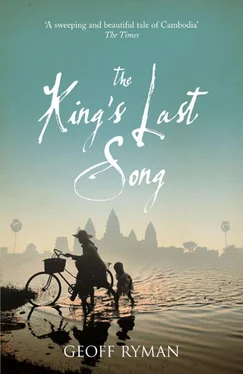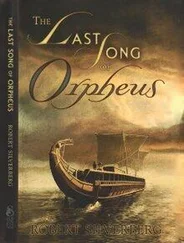‘So,’ says the German, fiddling with his automatic focus. ‘There are many bas-reliefs on Hindu themes. Did Cambodians become Buddhist later?’
‘There was a king,’ says Map. The morning is so quiet and bright he wonders if he can be bothered trying to make this foreigner understand who Jayavarman was and what he means to Cambodia.
‘When Angkor Wat City is conquered, he takes it back from the foreigners. He make many many new temples. Angkor Thom, Ta Prohm, Neak Pean, Preah Kahn, all those temples. He make Cambodia a Buddhist country. After there is Hindu revolt, but Cambodians still remember him.’
Map says the King’s name, feeling many complex things: respect, amusement, love. The German asks him to repeat it.
‘Jayavarman Seven.’ Map can feel his smile stretch with sourness.
He thinks about the five-hundred-dollar bribe he paid a few years ago to get a job removing landmines. He bribed the wrong person and didn’t get the job. He’d sold his motorbike to get the money. Originally he wanted to use it to pay for his wedding, but he thought the job would be a better investment. His fiancee left him.
He thinks of all the so-called leaders and the tangled, selfserving mess they are making of the country. ‘Now we need Jayavarman.’
The gold leaves have slept for a thousand years.
Two metres down, below the range of ploughs and metal detectors, they lie wrapped in layers of orange linen and pitch.
They were carried at night, hurriedly, jostled under a bridge and plunged down into the mud by the canal to keep them safe. They were cast in imitation of a palm-leaf manuscript, inscribed and inked. The leaves still yearn to speak, though the ink has long since soaked away.
The canal overhead simmered in the heat, then silted up. The water ceased to flow. The soil was parched and inundated by turns for centuries. Rice reached down, but never touched the leaves or their linen wrappings.
Gold does not rust. Insects and rodents do not devour it. Its only enemy is greed.
On 11 thApril, in a version of 2004, something fiercely invasive drives itself into the Book. A corer grinds its way down through five packets of leaves. Then it hoists part of them up and out of the ground.
For the first time in a thousand years, light shines through the soil, linen and pitch.
The Book is awake again.
Light shines on a torn circle of gold. It shines on writing. The words plainly say in Sanskrit, ‘I am Jayavarman.’
My name in death will be Parama Saugatapada. In life, I bore a king’s title, Victory Shield, Jayavarman. I will be known as Jayavarman the great builder, father of the new city, the wallbuilder of Indrapattha. I am lord of the temple that is like no other, the temple that is history in stone, the great Madhyadri. I will be known as the founder of the King’s Monastery. I will be known as the son of Holy Victory City, Nagara Jayasri that rose like a flower beside the Lake of Blood. My face will greet those who come to the City for a thousand years. My son calls it my Mango Face, ripe and plump. My Mango Face looks four ways, in the cardinal directions. My face is the four Noble Truths. I am Jayavarman, the bringer of the new way that subsumes the old and surmounts it.
The Gods themselves listened to the great soul (Buddha) for enlightenment. So it is that the new kingship enlightens the old. This new kingship builds walls to protect the City and builds love in the hearts of the people. Love is also a wall to protect the City. I once had the name of Prince Nia, Hereditary Slave. How a prince came to be called Slave is only one reason why I burn to do a new thing. I will turn the eyes of language away from dedications and gods. I turn my gaze towards people, just as I caused my temple the Madhyadri to honour the images of farm girls and merchants and Chinese envoys. I turn the light of my mind to ordinary days. My words will show lost people. My words will show the sunlight of great days now turned to night. My words will show parades and elephants and parasols whose march has long since passed into dust.
The Prince was supposed to be asleep with the other children.
The adults were all in their hammocks. Only insects were awake, buzzing in the heat. To fill the silence, the Prince stomped up the wooden steps as loudly as he could.
The King’s gallery was empty. The gold-embroidered curtains breathed in and out as if they were asleep. The only other person he could see was a servant girl dusting the floor.
The girl was about four years older than the Prince. Maybe she’d want to play. He broke into a run towards her, but then lost heart. Old palace women with wrinkled faces and broken teeth would pick him up and fuss over him, but pretty young girls with work to do would be told off for it.
The Prince grew shy. ‘Play with me,’ he asked, in a soft breathy voice.
The girl bowed and then smiled as if there was nothing more delightful than to be approached by a person of his category. ‘I must work,’ she beamed, as if that were a pleasure too.
He was a sujati , a well born person. The girl was bare-chested, some category of worker. A diadem of wooden slats was tied across her forehead, and the stain across her temples was her passport into the royal enclosure. The Prince watched her clean. For a moment it was interesting to see the damp cloth push grains of food through the knotholes and gaps in the floorboards.
Then boredom returned as unrelenting as a headache. Boredom drove him. It was nearly unbearable, the silence, the sameness.
The thin floor rested high off the ground on stilts. The floorboards gave the boy the foot-beat of a giant. He lifted up his bare foot, drove it down hard, and felt the whole house quiver. He giggled and looked back at the girl and then took more high, hammering steps across the floor.
The girl paid no attention.
No one wore shoes, so dusty footprints trailed across the red gallery floors where the girl had not yet cleaned.
To the Prince they looked like the tracks of game across a forest floor.
He was a hunter in the woods. He charged forward. ‘I see you, deer! Whoosh!’ He let fly imaginary arrows. ‘I see you, wild pig! Whoosh I get you!’
He looked back at the girl. She still dusted.
Suddenly the footprints looked more like those of enemy troops. He imitated the sounds of battle music: conch shell moans and the bashing of gongs. He paraded, thumping his feet. He was a Great King. He waved the Sacred Sword over his head and charged.
He thundered back down the length of the gallery, wailing.
The girl still dusted, looking hunched.
He could be naughty, this prince. He had a formal name, but everybody nicknamed him Catch-Him-to-Call-Him, Cap-Pi-Hau.
All right, Cap-Pi-Hau thought, you want to be slow and boring, I will make you play.
He ran back and forth up and down the empty gallery until the entire floor shivered. He shouted like a warrior. He cried like egrets on the Great Lake, surprised by battle and keening up into the sky.
He stalked down the front steps and out into the thinly grassed enclosure. He pummelled his way back into the gallery. He ran in circles around the girl. He bellowed as loudly as he could and jumped boldly, no steps at all, out of the house and fell face down onto the dry ground. He billowed his way back into the gallery, trailing dust behind him.
Each time he ran past her, the little girl bowed in respect, head down.
Most devilish of all, he clambered up the staircase to the forbidden apartments on the storey above. He rumbled all the way to the head of the stairs and spun around, to see if he had succeeded in making her follow him, to chastise him and pull him back down. Instead the little girl looked mournfully at her floor. Everywhere she had already cleaned there were footprints and shadow-shapes of white dust.
Читать дальше












